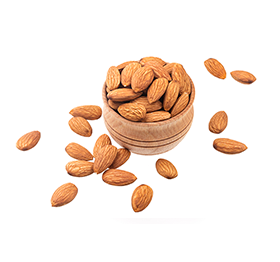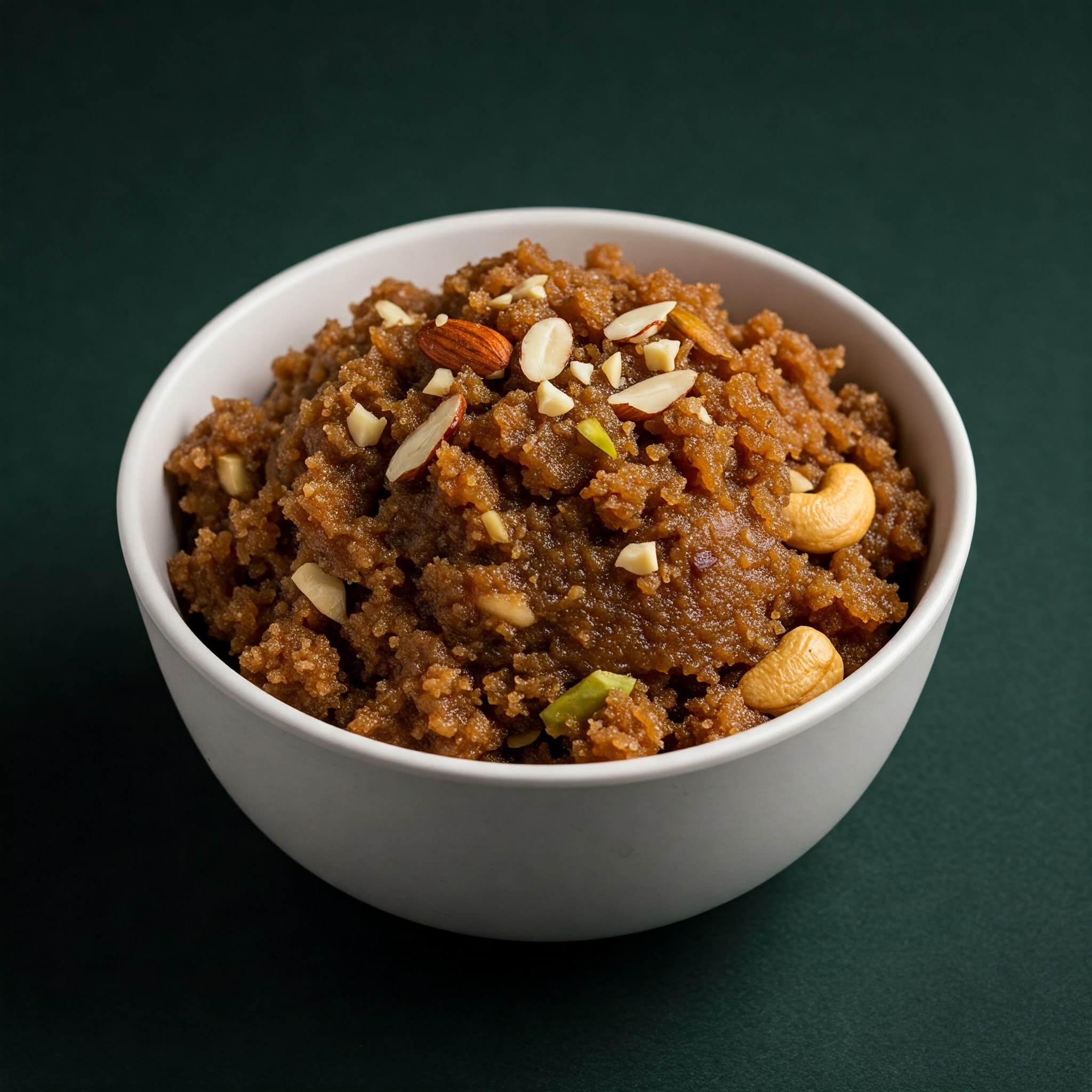Almond (बादाम)
baadaam

About Almond
Almond
Almonds, yet another one of the oldest crops, technically Almonds are the seeds of a fruit of Almond tree NOT NUT.
Almonds can be eaten raw, ripe or cooked/ roasted/ toasted. In Recent years Almond have become must eat food / ingredient because of it’s versatility and health benefits. Mainly there are two varieties available in the market these are Sweet and Bitter Almonds and largely people consume sweet almonds and Bitter almonds used for extracting Almond oil and other uses. Almonds are rich in various nutrients. In Ayurveda also Almonds are much appreciated, </span class="healthy">Almonds nourish the brain, nervous system, helpful in improving memory, powerful source of strength, and Almonds are packed with Antioxidants.
Almonds, often referred to as the "king of nuts," embody a blend of elegance and nourishment. With their delicate, light-brown shells and creamy, smooth interiors, they evoke a sense of warmth and tradition. In Indian cuisine, Almonds play a significant role, from enriching festive sweets like barfis to adding a luxurious crunch to savory dishes.
Rich in heart-healthy monounsaturated fats, protein, and a treasure trove of vitamins and minerals, almonds are not just a treat for the palate but a boon for overall health. They are celebrated for their ability to lower bad cholesterol, support weight management, and provide a natural energy boost. Their antioxidant properties, especially from vitamin E, help combat oxidative stress, promoting radiant skin and a youthful glow. Beyond their nutritional benefits, almonds carry cultural significance. Often used in rituals and celebrations, they symbolize prosperity and well-being. Whether soaked overnight for a nutritious start to the day or ground into a silky paste for rich gravies, almonds enhance the flavors and textures of countless dishes. To Include Almonds in your daily menu, logon to Planmeal
Almonds: Nature’s Delight for Health and Taste.
- Almonds are loaded with Antioxidants and nutrients
- Almonds are high in Vitamin E
- Almonds can help in Managing Blood Sugar, and Blood Pressure
- Almonds prevent harmful Oxidation of LDL (bad) Cholesterol
- Almonds can reduce hunger (Lowering overall calorie intake) - effective in Weight loss
- Good for gluten free dieters
- Almonds are good for skin health
Again if Almonds are consumed in excess, can be harmful, here are some of the disadvantages of eating Almonds in high.
- Digestion Problem
- Vitamin E Overdose
- Medication Interaction
Almonds are an important source of nutrition, rich in healthy fats, protein, vitamins, and minerals. They support heart health by lowering bad cholesterol levels and are beneficial for weight management due to their high fiber content, which promotes satiety. Additionally, almonds provide antioxidants, such as vitamin E, which help combat oxidative stress and support skin health. Almonds are commonly used for enhancing cognitive function. Soaking almonds overnight and consuming them in the morning is a traditional practice believed to improve memory and concentration. Almond oil is also utilized for its moisturizing properties, making it popular in skincare routines. Overall, almonds are a valuable addition to a balanced diet and holistic health practices.
How to Store Almond
To store Almonds, first ensure they are kept in an airtight container to protect them from moisture and pests. Choose a cool, dry place away from direct sunlight, such as a pantry or cupboard. For longer shelf life, refrigerate the almonds; this helps maintain their freshness and flavor. If you have a larger quantity, consider freezing them, which can extend their usability for up to two years. Before use, allow refrigerated or frozen almonds to come to room temperature to prevent condensation. Regularly check for any signs of spoilage, such as off odors or discoloration.
Shelf Life of Almond
Almonds have a shelf life of about 6 to 12 months when stored in a cool, dry place in an airtight container. Refrigeration can extend their freshness, while freezing can keep them good for up to 2 years.
How to Check Almond Before Buying
When checking almonds before buying from a local vendor, first inspect the packaging for any signs of damage, moisture, or pests. Ensure the almonds are whole, without any cracks or signs of spoilage, such as discoloration or an off smell. Fresh almonds should have a firm texture and a pleasant nutty aroma. If possible, taste a sample to assess their flavor and crunchiness.
If you consume almonds regularly, procuring in bulk can be economical and convenient. However, ensure you have appropriate storage conditions to keep them fresh. Store bulk almonds in an airtight container in a cool, dry place, or refrigerate them to extend their shelf life. Be cautious if you don’t use almonds often; purchasing smaller quantities may be preferable to prevent spoilage and ensure freshness. Always prioritize quality to enjoy the full benefits of this nutritious nut.
Explore
Explore our services and take your business to the next level.
Recent Posts

Savor the warmth of Palak Dal Khichdi, a nourishing and comforting dish that bea...

Potato Bhajia is a delicious and versatile snack that adds a burst of flavor to...

Rawa (Semolina) Chilla is the perfect addition to your weekly meal plan. Packed...

Kuttu Ka Halwa is the perfect addition to a balanced weekly menu, offering a del...

Bajra Thepla is a delicious and nutritious addition to your weekly meal plan. Pa...
Ready for a Healthier You?
Take control of your wellness! Get a customized meal plan that fits your lifestyle. It's time to eat smarter, feel better, and transform your life!
Get Your Plan Now!Already a member? Login and start now!
Nutrition Facts
Serving Size:
Servings Per Container: 1
| Amount Per Serving | ||
|---|---|---|
| Calories | 609 | |
| Fat | ||
| Saturated Fat | ||
| Trans Fat | ||
| Cholesterol | 0 | |
| Sodium | 1.5 | |
| Carbs | 3.04 | |
| Fiber | ||
| Sugar | 11 | |
| Protein | 21 | |
| VitaminD | ||
| Calcium | 228 | |
| Iron | 4.59 | |
| Potassium | 699 | |
* Percent Daily Values are based on a 2000 calorie diet.
* Percent Daily Values are based on a 2000 calorie diet.




